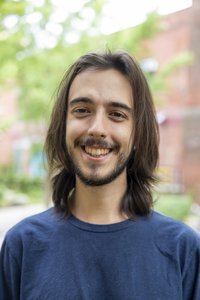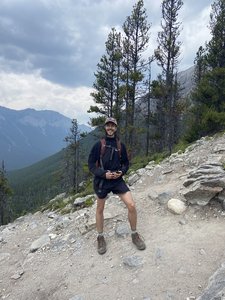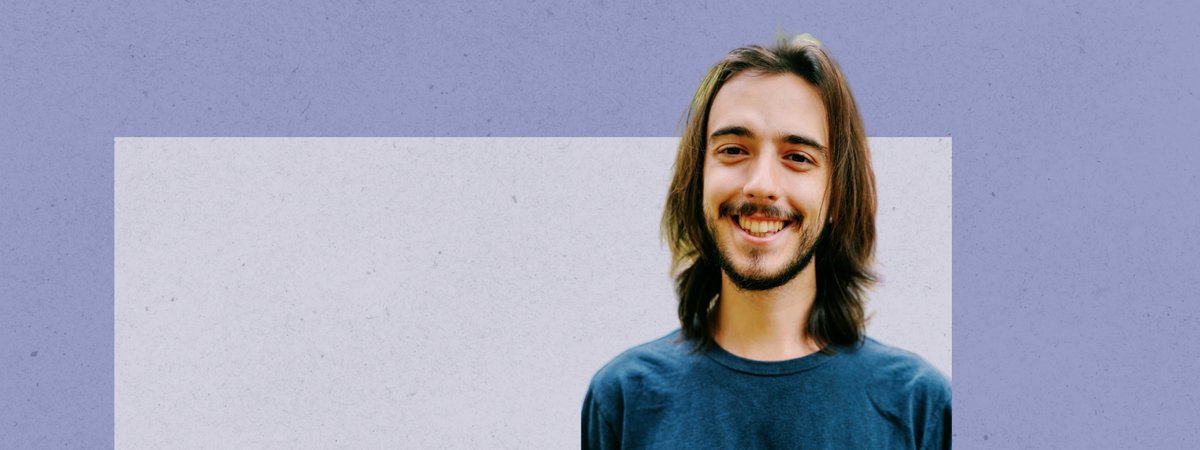PhD Candidate
Experimental Condensed Matter Physics

Julian Nickel is a PhD candidate studying Experimental Condensed Matter Physics in the research group of Prof. Stephen Julian. His work consists of synthesizing and characterizing a family of materials called palladium oxides. He is interested in these materials because of their similarities to the well-studied family of high temperature superconductors - the Cuprates (as well as the newer family of nickelates). These similarities mean that some palladium oxides likely have interesting properties and may have a superconducting phase as well. Furthermore, the slight differences between palladium and copper may allow for even higher-temperature superconductors, though some pressure might be needed to get them there.
Julian grows these materials in his lab using solid state and salt-flux techniques, and measures their properties using a cell he designed himself and a probe he has heavily modified. He takes great pride in creatively putting together a big aspect of his research himself. However, like all scientists, he is continually collaborating. Most of his collaborators are in the Earth Sciences department, both at UofT and Western University, where they use high-pressure furnaces to attempt to grow new materials. Julian hopes to also incorporate high-pressure anvil cell measurement techniques to his research going forward.
Despite his scientifically minded parents, and especially his father attempting to nurture a scientific curiosity from early childhood, Julian wanted to be an actor or a comedian. He traces his initial exposure to the possibility of studying physics to his neighbour back in Vancouver, Bill, who lived across the street from him. Julian inquired about Bill’s profession to his father and was told that Bill was a "Physicist". Thinking that being a physicist would be a great job where one would just lounge around all day and think, he now understands this to be very untrue.
Because of this exposure, his architect-Dad’s life-long interest in engineering and physics, and his relative proficiency in math, Julian decided to take an undergraduate degree in combined honours math and physics at UBC (which he tacked a minor in philosophy on to in order to give himself less sleep). This is when he learned that Bill, who lived across the street from him, was Bill Unruh, who discovered the Unruh Effect.
With this background Julian had intended to take on a graduate degree in Theoretical High Energy Physics; he had also taken a summer research position working remotely at CERN during the Pandemic Times.
At UofT Julian had an epiphany: sick of sitting in his chair and coding, years of experience working with his hands at his father’s furniture shop, and wanting to have a plausible direct impact preventing the incoming climate crisis, he chose to work on superconductivity, hoping to push forward a technology that could provide positive societal change.
Throughout his time so far at UofT, Julian has fully embraced the community. He has met many amazing fellow graduate students, throughout the entirety of the university, many becoming great friends, making Toronto feel like home. Together with these friends he has had the pleasure of captaining an intramural ultimate team made up almost entirely of physics grad students (the Floppy Discs) for three years now. This is an activity that has consistently sparked joy in his life.

Besides Ultimate Frisbee and his other passion of marathon running (having completed two half marathons with a third coming up in October 2024, and a full one in Spring 2025) his other extra-curricular has been student advocacy. In the 2023-2024 school year he served on the Bargaining Support Committee of CUPE 3902 Unit 1, the union that represents TAs at UofT. This school year, 2024-2025, he is serving as the Vice-President, Academics of Divisions 3 & 4 (natural and applied sciences) at the Graduate Students’ Union. In both of these roles he has had the great pleasure of advocating for and organizing with his fellow graduate students. He believes that the work he does in the lab and the work he does organizing are directly linked as projects to enhance the communities he is a part of. The skills he learns in these aspects of his life continuously help him improve the other.
Julian does not have concrete plans for the far future, letting it unfold organically to create a fulfilled life. He could see himself becoming a professor, and also see himself working in advocacy. His vague plan after completing the PhD is to get a postdoc in Europe and then return to the west coast of Canada. If he were to select one goal to complete in the next ten years it would be to own a cat.

